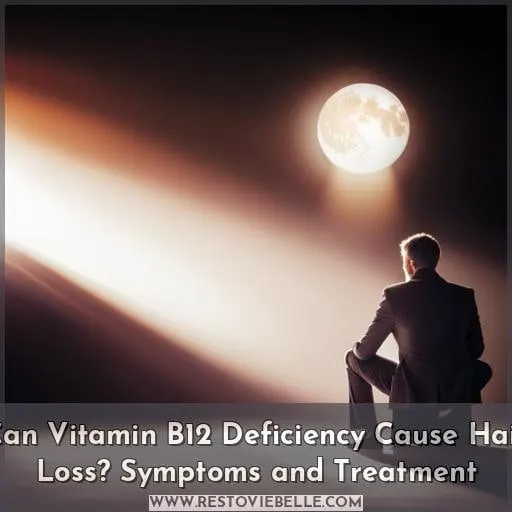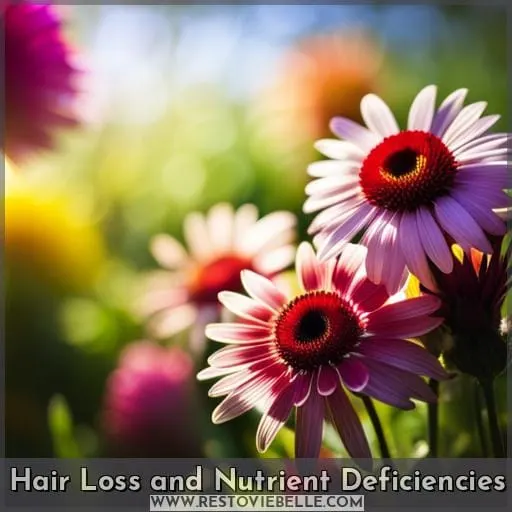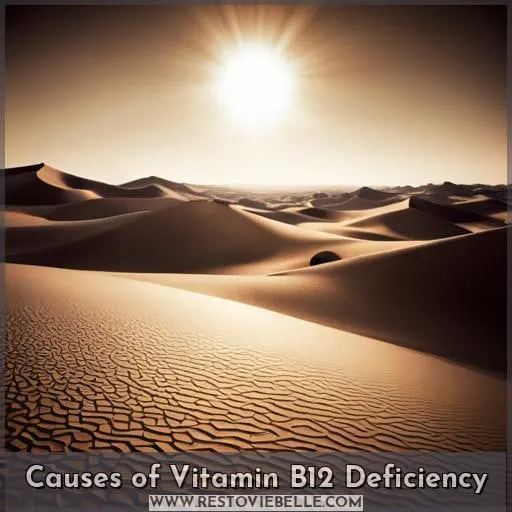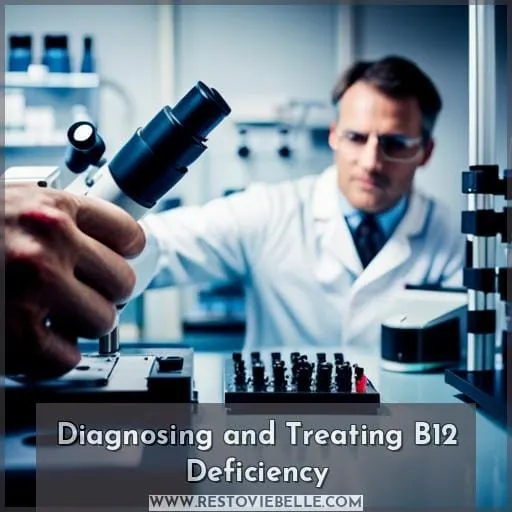This site is supported by our readers. We may earn a commission, at no cost to you, if you purchase through links.

As a trichologist, I often see nutritional deficiencies play a role in hair health. Let’s explore how low B12 levels may contribute to thinning hair, and what you can do to get those lush locks back.
The good news? Many cases of hair loss are reversible when identified and treated early. With a few adjustments to your diet or supplements, you can get your hair growing strongly again.
Don’t worry – we’ll figure this out together. Thinning hair is frustrating, but you’ve got this!
Table Of Contents
Key Takeaways
- Vitamin B12 is essential for healthy hair growth, and deficiency is linked to excessive shedding and thinning.
- Causes of B12 deficiency include insufficient dietary intake, absorption issues, medication use, and other medical factors.
- Restoring B12 levels through diet, supplementation, or injections can help improve hair thinning associated with deficiency.
- Consulting healthcare professionals can help diagnose B12 deficiency and guide treatment to optimize levels and support hair health.
Hair Loss and Nutrient Deficiencies
You’re deeply concerned that your increasing hair shedding could be connected to a preventable nutrient deficiency. While genetics play a role, dietary factors like vitamin B12 are linked to hair health.
Low B12 can disrupt hair follicle cycling and cellular turnover. However, B12 doesn’t act alone. Hair depends on balanced interactions between micronutrients like iron, zinc, and vitamin D.
Evaluating dietary vitamin and mineral intakes, blood levels, and symptoms helps identify deficiencies contributing to shedding. Understanding these synergies empowers you to support healthy hair growth through nutrition and lifestyle changes or supplements if needed.
With a doctor’s guidance, restoring micronutrient balance may improve hair density.
The Role of Vitamin B12 for Hair Health
Now let’s dive into vitamin B12 and its relationship to hair loss. It’s crucial for healthy cell growth, division, and production. Inadequate B12 levels can disrupt these cellular processes in the hair follicles, slowing growth.
A telltale sign is hair thinning or excessive shedding. Other symptoms are fatigue, brittle nails, and nerve issues since B12 aids nervous system function. Without enough dietary B12 from meats, fish, eggs and dairy, deficiency can occur.
Older adults, vegans, those with absorption issues, and individuals on stomach acid-reducing medications also are at higher risk.
Hair falling out more easily along with unusual weakness or tingling? Have your B12 level checked. Supplementing if deficient, and adding B12-rich foods can help restore shine and thickness to your hair.
Symptoms of Vitamin B12 Deficiency
Fatigue, neurological issues, and anemia may indicate a vitamin B12 deficiency. If you’re experiencing unusual tiredness, numbness, memory problems, or shortness of breath, talk to your doctor about getting tested for low B12 levels, which can contribute to hair thinning.
Fatigue
Tiredness, sluggishness and lack of energy can result from vitamin B12 deficiency. This exhausting fatigue stems from low B12 levels, as the body requires B12 for energy production. Consuming vitamin-rich foods or supplements helps obtain the needed B12, which restores energy and reverses B12 deficiency fatigue.
Neurological Problems
Numbness and tingling in your hands and feet could be signaling a vitamin B12 deficiency.
- Loss of reflexes
- Issues with balance and coordination
- Confusion or memory problems
- Numbness or tingling in the hands, legs, or feet
Vitamin B12 plays an vital role in maintaining nerve fibers, and low levels can lead to neurological issues.
Anemia
You’re pale as a ghost with anemia from that B12 deficiency sapping your blood. The anemia-B12 link is clear. Deficiencies drain your iron stores, causing fatigue, irregular heartbeats, and shortness of breath.
See your doctor for bloodwork to check intrinsic factor and treat with B12 supplements or diet.
| Symptom | Cause |
|---|---|
| Fatigue | Low iron stores |
| Irregular heartbeat | B12 deficiency |
| Shortness of breath | Anemia |
The anemia-B12 connection is evident. Work with your doctor, get tested, and restore healthy iron levels through diet adjustments or properly administered supplements.
Causes of Vitamin B12 Deficiency
Hold on tight, ’cause lackin’ B12 makes strands come loose. Getting enough B12 prevents hair falling out in clumps.
Main causes include:
- Following a strict vegan or vegetarian diet. No meat means no B12.
- Having absorption issues – like pernicious anemia or celiac disease.
- Taking certain medications long-term.
- Being older. Production of B12 absorption factors decline.
- Having surgeries removing parts of your intestines.
Focus on dietary sources like fish, meat, eggs and dairy. Or try supplements or injections under medical supervision.
Diagnosing and Treating B12 Deficiency
Get your vitamin B12 levels tested if you’re experiencing symptoms like unusual fatigue or hair loss. A simple blood test can diagnose a deficiency. B12 injections may be prescribed, along with supplements and dietary changes to increase intake.
Severe deficiency can lead to irreversible neurological damage, so early detection and treatment is key.
Consume more B12-rich foods like eggs, dairy and meat or try supplements and fortified foods.
Work with your doctor to find the right treatment to correct this deficiency, protect your health, and potentially reverse associated hair loss.
Optimizing Vitamin B12 Intake
Prioritize vitamin B12-rich foods or talk to your doctor about supplementation if you have persistent hair loss. Eating B12 sources like fish, dairy, eggs, and meat can help prevent deficiency, which can impact your hair and health.
However, absorption issues may require supplements or injections, especially for vegans. Many cereals, plant milks, and nutritional yeasts are fortified with B12. Try tracking your diet in a journal; if you fall short of the recommended daily B12, discuss supplements or injections with your provider.
Optimizing your vitamin B12 intake through a balanced diet or with your doctor’s guidance can promote healthy hair growth and nourishment.
Conclusion
Hair loss can potentially be linked to vitamin B12 deficiency. Consulting your doctor is advisable to determine suitable testing and treatment. Whether through dietary changes or supplements, optimizing B12 intake under medical guidance may help restore hair growth while preventing complications.
With expert care from specialists such as dermatologists and trichologists, addressing nutritional deficiencies like B12 could make the difference between thinning locks and lush, healthy hair.












